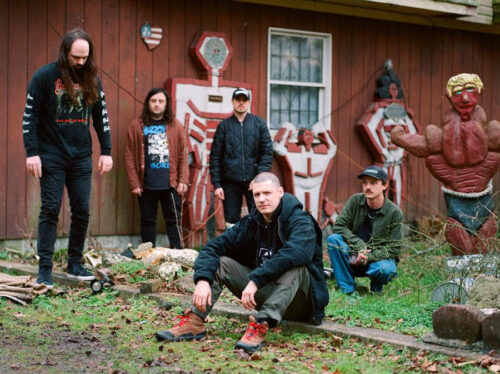
Full of Hell burst forth with incredible force from Ocean City, Maryland, 15 years ago. Over five full-lengths, five collaborative full-lengths, and countless splits, EPs, singles, and noise compilations, they’ve evolved at extraordinary speed, their music becoming more complicated and technical without ever slowing down or losing its soul. Everything on a Full of Hell album feels like a blur: smears of guitar, harsh noise shaken like gravel in a bag, singer Dylan Walker’s snarl and bite carrying him into outer space or into the core of the earth. They’re coiled, interlocking, impossible to penetrate, and they move with alarming speed. They have now reached terminal velocity.
Having created their own context, Full of Hell are now able to walk around within it, to survey its terrain, to visit far corners and see who’s nearby. Their new album, Coagulated Bliss— out today on Closed Casket Activities— sounds like Full of Hell, but it’s nothing like any Full of Hell record that’s come before it. These songs are trimmer, less freighted with anxiety, more interested in opening up than speeding away. Its bile is sometimes funneled into traditional song structures. It never shies away from the extreme harsh noise, unrelenting spirit, and pitch-black sadness of previous Full of
For release day, the band has shared a music video for “Fractured Bonds to Mecca.” The video’s concept was co-written by Full of Hell multi-instrumentalist Sam DiGristine who says the video is “…about an endless cycle of struggle, trying to find your way in a familiar place yet still feeling lost. Alienated by your loved ones and giving it all for a chance at salvation. Inspired by films such as ‘ The Incredible Melting Man,’ ‘The Holy Mountain’ and ‘Altered States.’ The journey never ends. The cycle continues.”
Dylan Walker continues, “This song is about a genetic curse. Having to live through inherited flaws and bearing witness to your own familial destruction. Lyrically, it’s very inspired by Thee Silver Mt. Zion at their darkest and most honest moments, speaking about our own inhumanity”







